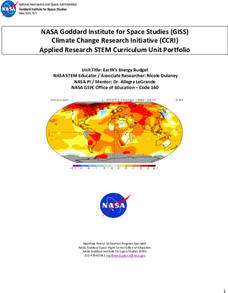Curated OER
Reason for the Seasons
Young scientists examine why we have seasons on Earth, and how the motion of the Earth around the Sun causes them. Groups of learners are given a variety of balls, a bamboo stick, a marker, and a flashlight, then use the objects to...
University of California
Seasons Lab Book
Unlock the mystery behind seasonal change with a collection of worksheets and activities. Whether they are drawing pictures of Earth's orbit around the sun or graphing the temperature and daylight hours of different locations from around...
Starry Night Education
The Year and Seasons
Turn your classroom into a live demonstration of how the earth and sun interact to create the four seasons. Using a globe, a light source, and a series of constellation cards, super scientists discover how the motion of these...
Curated OER
The Reason for the Seasons
Students compare graphs of their data that was generated on a NASA website. For this seasons lesson students complete a lab activity.
Weber State University
The Sun and the Seasons
Why is there more daylight in June than in December if you live above the equator? How does the angle of sunlight shift throughout the year? Answer these questions and more with an interactive article about the sun, its path through the...
Core Knowledge Foundation
Weather or Not, Seasons Change
Embark on a year long investigation of the seasons with this 10-lesson earth science unit. After being introduced to different types of weather and the tools used to measure it, young scientists perform fun hands-on activities that teach...
Curated OER
My Angle on Cooling
Students explore how the angle and distance of an object can change it's temperature. After reviewing how the position of the Earth affects the temperature of the planet, student groups design and perform an experiment to test how...
Scholastic
Lesson Three: The Earth, Movement in Space
If you feel like you're standing still, you're wrong! The Earth is constantly rotating and orbiting under our feet. Demonstrate the Earth's movement within the solar system with a collaborative activity. With a candle or lamp in the...
Curated OER
Sky Time: On the Astronomical Meaning of the Day, Year and Seasons
Students simulate the movement of the Earth using their body motion. In this earth science lesson, students explain how this causes seasonal changes on Earth.
Curated OER
The Earth and Beyond
Photographs and graphics bring the solar system and Earth to life in this presentation. Viewers are taken on a virtual field trip, beginning with the sun and planet placement, and proceeding through both Earth and the moon's movements....
NASA
Earth’s Energy Budget
Take the time and energy learn about Earth's energy budget. An engaging unit of four lessons focuses on the components that make up Earth's energy budget. Future scientists come up with a formula for the energy budget, then use software...
Scholastic
Lesson One: The Earth, Background and Glossary
How much do you really know about our planet? Middle schoolers build up their prior knowledge about Earth, its placement in the solar system, its composition, and important geological vocabulary with an introductory earth science lesson.
Stanford University
Solstice and Equinox Season Model
How can December 21 be the shortest day of the year when all days are 24 hours long? Pupils see how to build a model showing the differences between winter and summer solstices and equinoxes. Using this model, classes can then discuss...
NorthEast Ohio Geoscience Education Outreach
Earth, Sun and You
Middle schoolers model Earth's revolution round the sun by walking a mini-globe around a lamp. You will assess whether or not they tilt and rotate the planet properly and that the revolution is counterclockwise. Discussion beforehand...
Curated OER
Modeling the Seasons
Junior geologists become the force that makes the world go around! With a lamp on the floor in the middle of the room to represent the sun, volunteers hold a globe, revolve, and rotate. Observers notice how the light hitting the globe...
Curated OER
Seasons and Day Time
Learners label a diagram of the Earth rotating about the sun and indicate the direction of the rotation and the seasons at each location. They indicate the seasons, the poles, the hours of daylight at each pole, the direction of rotation...
NASA
The Science of the Sun
There's more to that glowing ball of light in sky than most children realize. From the overall structure of the solar system, to the changing of the seasons, these hands-on lessons open the eyes of young scientists to the important role...
NASA
Earth's Global Energy Budget
Introduce your earth science enthusiasts to the earth's energy budget. Teach them using an informative set of slides that include illuminating lecturer's notes, relevant vocabulary, embedded animations, colorful satellite maps, and a...
Core Knowledge Foundation
A Time for All Seasons - Summer
The sun is shining and the birds are singing, what better time to teach young learners about the fun season of summer. In this week-long science series, children learn how the rotation and orbit of the earth influence the days and...
Curated OER
What Causes Day and Night?
Why do we have four seasons? A series of questions about the Earth's orbit and its impact on seasons challenge Earth science students.The second page of the resource has nine multiple choice questions, such as "One year on Earth is one...
Curated OER
SCHOOLYARD SUNDIAL
Students study the apparent motion of the Sun in the sky over the course of a day and a year, and analyze what causes seasons on Earth. They participate in a project that has both a science as well as an art component.
Curated OER
The Reasons for the Seasons
Young scientists use a globe and a light to simulate the rotation of the earth and sun to show the seasons. Additionally, they simulate direct sunlight and indirect sunlight showing intensity of the sun, and answer questions based on...
Curated OER
Seasons
Students investigate the reason for seasons on Earth during three activities. They construct a model of the Earth and Sun to identify patterns in the changes of the angle of light on the Earth's surface. Then they conduct a heat...
Curated OER
Reason for the Seasons
Learners study the seasons of the Earth. In this seasons lesson, students study the science of the seasons on Earth by studying the tilt and axis of the Earth's orbit. Learners read background information and four experimental activities...

























